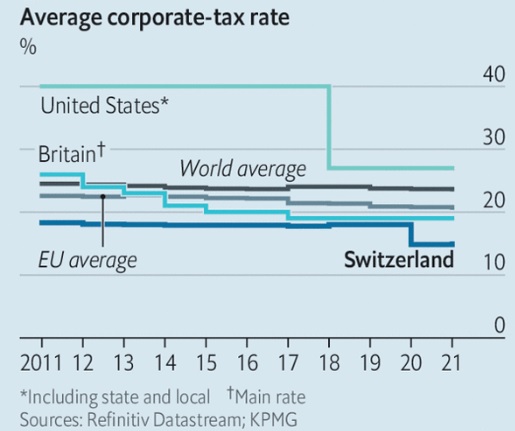Some people are urging a national divorce between blue states and red states, but a far more practical approach is Swiss-style federalism.
I’ve been a long-time advocate of copying Switzerland.
 It ranks very high for economic liberty, and this (predictably) translates into widespread prosperity.
It ranks very high for economic liberty, and this (predictably) translates into widespread prosperity.
And it has specific policies that warm my heart, such as a very successful spending cap (sort of like the Taxpayer Bill of Rights in Colorado) as well as a retirement system based on private savings.
Another great policy is federalism, and that is the focus of today’s column.
Richard Rahn explained in the Washington Times some reasons why Switzerland is a role model of sensible governance.
The Swiss have developed over the last nine centuries (and particularly since their major constitutional rewrite in 1848) a system most responsive to the needs of the people, including protection of person, property and civil liberties. Most government takes place at the local level (2,172 communes) by democratic consensus. Decisions that cannot be made at the local level are then made at the canton (26 states) level,
and the few remaining decisions, such as defense, trade and other treaties, are made at the federal level. At the federal level, there are seven councilors who govern the country as equals with staggered five-year terms and with the principle of collegiality — representing the major political parties. They rotate the title of “president” among them for one-year terms. This system has given the Swiss unparalleled stability and prosperity, and no cult of personality. The collective and forced-tempered decision-making has kept them from doing many of the unwise and destructive things other countries have done.
Even the OECD has noticed the advantages of federalism.
And the Economist also recognizes advantages of the Swiss approach. Here are some excerpts from an article about the business environment from last May.
Switzerland has prospered as a haven for businesses far beyond what might be expected of a small, landlocked country with few natural resources. It is home to 13 of the top 100 European firms by market capitalisation and 12 of the top 500 worldwide. What is the secret sauce of the Swiss?
…a unique political model that mixes federalism and direct democracy, a weak central government, light regulation, top-notch research universities, and rivalry in education and taxation between the cantons that make up the Swiss confederation. …The Swiss have no particular affinity for their compatriots in other cantons. …But they joined together in such a way as to foster self-reliance and responsibility. …This approach makes for light regulation from the top. …Cantons run health care, welfare, education, law enforcement and fiscal policy. That allows them to compete to be attractive to businesses and their workers. Corporate taxes are low.
How low are corporate taxes?
Not as low as places such as Bermuda and the Cayman Islands, where the rate is zero.
But lower than other major nations, as illustrated by this chart that accompanied the article.
The Economist also ran an article on national comity last October.
…at the heart of Europe, one nation in one state is one of the most happily, successfully multilingual places on Earth. Switzerland, which has a population comparable in size to Hungary’s or Austria’s, has four official languages… How can a country so linguistically diverse work, and indeed be one of the richest in the world?
…The key to Switzerland’s functioning is its principle of territoriality: in most of the 26 cantons, one language rules. (Three cantons are bilingual in German and French, and Graubünden is trilingual in Italian, Romansh and German.) …Switzerland is the product of fiercely independent cantons joining the confederation for mutual benefit while still considering themselves sovereign. The country must respect localism, or it would not exist. …unity and uniformity are not the same thing.
The October article specifically focused on the benefits of federalism. Sort of unity through diversity.
But notice that the the pro-growth business climate described in the May article is a consequence of federalism.
Last but not least, in a column for the Foundation for Economic Education, Corey Iacono lists some of the reasons why advocates of individual liberty should admire Switzerland.
Switzerland has the fourth-freest economy in the entire world. …the ninth-highest per capita income in the world. …The Swiss have the third-highest median household income in the world…
Switzerland has the fourth-lowest level of government spending as a share of the economy among the 34 OECD countries. …The Swiss have genuine federalism and decentralized government. …The Swiss have a long history of armed neutrality…the fourth-highest gun ownership rate in the world. ..Marijuana is decriminalized. …the third-happiest country in the world. …Switzerland just might be one of the most libertarian countries in the world.
Indeed, it is the most libertarian country in the world according to one index.
To be sure, being the “most libertarian” is not the same as being libertarian Nirvana.
 As illustrated by this chart, Switzerland has done a much better job than the United States at preserving federalism, but there has been a trend toward more centralization.
As illustrated by this chart, Switzerland has done a much better job than the United States at preserving federalism, but there has been a trend toward more centralization.
And there are specific policies, such as a wealth tax, that definitely are not consistent with either libertarian principles or good tax policy.
But it’s still better than almost every other place in the world.
P.S. Given Switzerland’s relative success, I’m not surprised that there’s a movement in Sardinia to secede from Italy and become a Swiss canton.
P.P.S. More federalism and decentralization would help ease divisions in nations such as Belgium and Ukraine.
P.P.P.S. Here’s some humor about a possible red-blue divorce in the United States.
